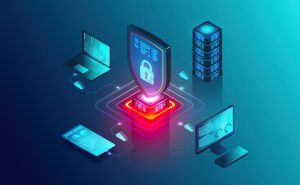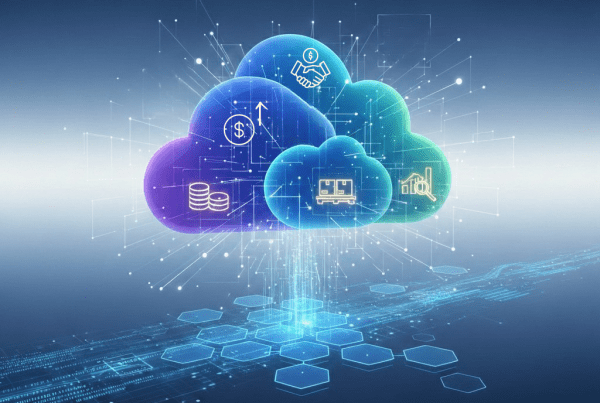Do you really know how secure your endpoint devices are? From personal laptops to mobile devices and tablets, businesses have more endpoint devices connected to their network than ever before, creating easy entry points for cybercriminals. That’s why endpoint security is non-negotiable for growing businesses. It’s more than antivirus software, it’s a strategic solution to protecting every device that feeds into your network. Securing endpoints can prevent malware infections, detect insider threats, and ensure important data remains secure from malicious actors.
If endpoint security isn’t already a component of your cybersecurity program, this blog will teach you what it is and why it’s so important to implement. We’ll also cover the management tools and technologies that work together to create a cohesive endpoint security solution and explore how cloud-based endpoint security frees up time for remote and hybrid workplaces.
Endpoint Security Explained
Endpoint security refers to the practice of securing the various devices or “endpoints” that connect to a network. These endpoints can include desktop computers, laptops, smartphones, tablets, servers, and IoT devices like printers. With workplaces becoming more decentralized and mobile, endpoints are now vulnerable areas that are easily accessible and targeted by cybercriminals.
The goal of endpoint security is to protect devices from various threats and vulnerabilities that could compromise the confidentiality, integrity, and availability of data and systems. Everything from malware and unauthorized access to data breaches and other cyber threats post a great risk. Endpoint security is crucial not only to protect personal data and individual devices, but to strengthen the security posture for the entire business.

Why is Endpoint Security Important?
If your business is looking to strengthen resilience against threats and build a culture of digital safety, endpoint security is a key tool. Let’s breakdown why it’s so important:
1. Protection against malware
Malware such as ransomware, Trojans, and spyware are some of the most common threats to infect endpoints. Once compromised, the endpoint provides access to the rest of the network, allowing malware to spread and shut down operations. With effective endpoint security solutions, you can leverage antivirus and behavioral analysis detection to help detect and prevent malware from compromising devices in real time.
2. Data protection
Endpoints often contain sensitive data including customer data, financial slips, or important business documents. Securing these devices is necessary to prevent data breaches and unauthorized access to confidential information, protecting both the organization and its customers. This can be done by integrating data encryption, data loss prevention (DLP), and access controls to protect data both in storage and in transfer.
3. Insider threats
Threats are not always external. Some internal personnel may have malicious intent, or an employee may accidentally set off alarms. In either case, endpoint security can help organizations monitor and manage potential insider threats by enforcing user permissions, monitoring device activity, and logging user behavior. Doing so provides greater visibility into what your employees are doing and flags suspicious activity before it causes any damage.
4. Remote work and BYOD
With the increasing trend of remote work and the reliance on BYOD (Bring Your Own Device), there are more endpoints with access to business networks than ever before. If not properly secured, they can be easy targets. With endpoint security in place, businesses can enable security policies regardless of which device is being used or who owns it.
5. Compliance requirements
Many industries have specific regulatory compliance requirements (e.g., HIPAA) that mandate endpoint security measures to protect sensitive data and ensure legal compliance. If a business fails to secure endpoints, they might face large fines, legal penalties, or reputational damage.
6. Cyberattacks and vulnerabilities
Cyberattacks are continually evolving while vulnerabilities in operating systems, applications, and hardware are continually exploited by attackers. Endpoint security ensures systems are regularly updated by patching vulnerabilities to reduce the attack surface and prevent networks from being exploited.
7. Network hygiene
Maintaining good endpoint security practices contributes to overall network hygiene. Enforcing user access policies, system configurations, and regular software updates ensures your IT environment remains free from threats and compliant.
Endpoint security is essential to protect employees and businesses from targeted cyberattacks. It acts as the first line of defense in any business and plays a key role in ensuring compliance requirements are met. With a strong endpoint security solution businesses can reduce risk across all their devices, improve visibility, and stay proactive against changing threats or business operations.
What Does an Endpoint Security Solution Look Like?
An endpoint security solution offers more than traditional antivirus software. It refers to a range of protective technologies and management tools that work together to secure a business, including:
Antivirus and Anti-malware
The first layer of endpoint security is antivirus and antimalware software, which scans for and removes known viruses and emerging threats from all endpoints. The latest software integrates machines learning to analyze patterns and block threats in real time.
Firewall Protection
Firewalls are crucial for monitoring and controlling network traffic. They act as barriers between trusted internal networks and external networks, preventing unauthorized access and protecting against network-based attacks.
Data Encryption
Endpoint security typically involves encrypting sensitive data stored on devices. Encryption ensures that even if a device is compromised, the data cannot be accessed without the decryption key.
Patch Management
Regularly updating and patching software is vital to address vulnerabilities that could be exploited by attackers. Endpoint security solutions typically include patch management features to ensure all devices have the latest security updates. With automated patching software, businesses can close vulnerabilities even faster.
Device Control
With device control features, administrators can outline policies regarding the use of removable media, such as USB drives\ and external hard drives. This keeps malware or unauthorized data users from accessing the network and compromising data.
Web Filtering
Web filtering tools block access to potentially harmful or inappropriate websites, reducing the risk of users inadvertently downloading malware or falling victim to phishing attacks.
Endpoint security is a broad term that encompasses several important technologies and tools. Antivirus and antimalware protection are the baseline tools, essential for identifying threats and removing them from all endpoints. Firewalls, encryption, automated patching, and device control provide advanced protection from modern threats. Plus, with the use of machine learning and cloud-based management, detecting and responding to attacks becomes faster and easier. All of these components work together to protect every endpoint device in a business. And by doing so, businesses can enforce device policies, monitor activity, and manage their security posture in any work environment.
Cloud-Based Endpoint Security
On-premise endpoint security solutions are great for traditional offices, but the cloud offers more to modern businesses that rely on mobile, remote, or hybrid environments. Managing endpoint security in the cloud means businesses can scale faster and easier than with traditional solutions. This might look like adding or removing devices as the business grows or downsizes. Administrators can also manage policies, start updates, and monitor devices from one centralized cloud platform, making it easier to keep track of their security posture.
Instead of relying on IT personnel to manually maintain security tools and patches, updates can be sent automatically through the cloud to remote endpoints. Not only does this save time, but reduced overhead means businesses can invest more in strategic objectives that support long-term growth.
Business Continuity
Some businesses mistake endpoint security as exclusively an IT issue. The truth is, without endpoint security, a cyberattack on one device can lead to excessive downtime, data loss, and harm to your reputation. Your entire network could be impacted.
A strong endpoint security solution can identify and address threats quickly to keep systems operational while reinforcing trust among clients and stakeholders. Leveraging integrations with backup and recovery tools also helps restore data quickly and effectively even if a breach happens. When you adopt an endpoint security solution, you’re not just easing the workload on your IT teams. Your business will have the resources it needs to keep threats at bay and recover from unexpected attacks without slowing down operations.
What’s Next?
Now that you know what endpoint security is and why it’s important, it’s time to visualize this solution for your business. Not only will it help to safeguard your network, protect sensitive data, and mitigate the risks associated with emerging threats, you’ll have peace of mind knowing you are taking proactive steps to keep your business secure.
At Atlantic, we work with you as a managed partner to identify the devices keeping your business vulnerable and to develop a strategic endpoint security solution that grows with your business. Our around-the-clock monitoring also ensures your endpoints are always secure so you can keep doing what you do best.
Are you ready to take a proactive step towards better security? Contact the Atlantic team and start protecting your business at every level.
About Atlantic, Tomorrow’s Office
Atlantic is an award-winning office technology and IT solutions company providing Imaging Products, IT Support, Document Management, Cybersecurity and Managed Services to small and large companies in the New York City metropolitan area, and the Greater Philadelphia and Delaware Valley.
For the latest industry trends and technology insights visit ATO’s main Blog page.






